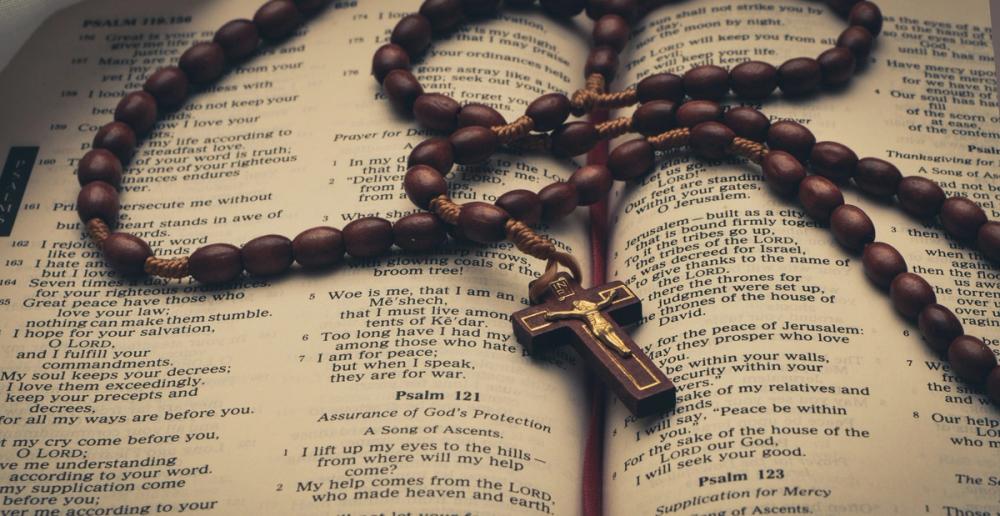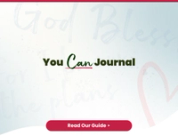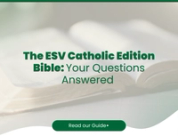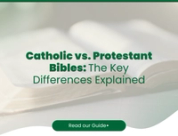Ever found yourself wondering, "What Bible do Catholics actually use?" or "Is there a special Catholic version of the Bible?" If so, you're definitely not alone! With so many different Bible translations and editions out there, it can feel a bit like navigating a maze. You want to choose the right one, whether for your own study, as a gift for a Catholic friend or family member, or simply to understand the Catholic faith better.
The good news? It's simpler than you think. Here at Eden, we're here to guide you through the key things to know about Catholic Bibles, so you can feel confident in finding exactly what you're looking for.
The Key Ingredient: What Makes a Bible "Catholic"?
The main difference between a Catholic Bible and most Protestant Bibles lies in the Old Testament. Catholic Bibles contain additional books, known as the Deuterocanonical books. These are ancient Jewish texts that were part of the Greek Septuagint version of the Old Testament, which was widely used during the time of Jesus.
These Deuterocanonical books are:
- Tobit
- Judith
- Wisdom (also called Wisdom of Solomon)
- Sirach (also called Ecclesiasticus)
- Baruch (including the Letter of Jeremiah)
- 1 Maccabees
- 2 Maccabees
- Additions to the books of Esther and Daniel
The Catholic Church considers these books to be inspired Scripture, while Protestant traditions generally do not include them in their biblical canon. So, a Catholic Bible will always include these seven books and the additions to Esther and Daniel.
Another important aspect is official approval. Catholic Bibles will typically have an Imprimatur ("let it be printed") and a Nihil Obstat ("nothing hinders"). These are declarations from Church authorities that the translation is free from doctrinal or moral error. This assures the reader that the content is in accord with Catholic teaching.
Popular and Approved Catholic Bible Translations: Finding Your Fit
Now that you know what makes a Bible Catholic, let's look at some of the most widely used and approved translations. Each has its own style and strengths:
New American Bible Revised Edition (NABRE):
- What it is: A modern English translation that is the basis for the Lectionary (book of readings used at Mass) in the United States.
- Why choose it: Excellent for following along with Mass readings (if you're in the US or your parish uses it) and known for its updated scholarship and readable language.
- Find it on Eden
New Revised Standard Version, Catholic Edition (NRSV-CE):
- What it is: An ecumenical translation (meaning scholars from various Christian traditions, including Catholic, Protestant, and Orthodox, worked on it) that is highly respected for its accuracy and scholarly integrity. The Catholic Edition includes the Deuterocanonical books in their traditional Catholic order.
- Why choose it: Praised for its literal accuracy while using inclusive language where appropriate. A popular choice for study and academic use.
- Find it on Eden
Revised Standard Version, Catholic Edition (RSV-CE):
- What it is: A revision of the classic RSV, specifically for Catholic readers. It's known for its more traditional, literal language, often described as "sacred English." The Second Catholic Edition (RSV-2CE) is a more recent update.
- Why choose it: Excellent for in-depth study due to its word-for-word accuracy. Many appreciate its dignified tone.
- Find it on Eden
The Jerusalem Bible / New Jerusalem Bible / Revised New Jerusalem Bible (JB / NJB / RNJB):
- What it is: Originally a French translation, these versions are known for their literary quality and thoughtful introductions and notes. The RNJB is the latest update, aiming for contemporary language while retaining scholarship. The Jerusalem Bible translation is used in the Lectionary for Mass in England, Wales, Scotland, and Ireland.
- Why choose it: If you're in the UK or Ireland, this is likely the version you'll hear at Mass. Its flowing language also makes it good for general reading.
- Find it on Eden
English Standard Version, Catholic Edition (ESV-CE):
- What it is: A more recent addition, the ESV is an "essentially literal" translation. The Catholic Edition has been adapted by Catholic scholars and includes the Deuterocanonical books. It's gaining popularity in various parts of the world.
- Why choose it: Offers a modern, readable, and accurate translation that's suitable for both study and devotional reading.
- Find it on Eden
Douay-Rheims Challoner Revision:
- What it is: The oldest English translation of the Catholic Bible, based on the Latin Vulgate. It uses very traditional, formal language.
- Why choose it: For those who prefer a historic translation with a very traditional feel. However, the language can be challenging for modern readers.
- Find it on Eden
Catholics use Bibles that are officially approved by the Church and include the seven Deuterocanonical books (Tobit, Judith, Wisdom, Sirach, Baruch, 1 & 2 Maccabees, plus additions to Esther and Daniel), with popular translations being the NABRE, NRSV-CE, and Jerusalem Bible.
Beyond Translation: Types of Catholic Bibles
Once you've considered a translation, think about the type of Bible that suits your needs:
- Study Bibles: These are fantastic for digging deeper! They include extensive notes, commentary, maps, cross-references, and articles to help you understand the historical context and meaning of the text.
- Reading Bibles: Designed for a smooth reading experience, often with less commentary to distract from the biblical text itself.
- Compact & Personal Bibles: Smaller sizes for carrying with you.
- Gift Bibles: Beautifully bound editions perfect for sacraments like Confirmation, weddings, or as a special present.
- Youth & Teen Bibles: With age-appropriate notes, reflections, and features to engage younger readers in Scripture.
How Do I Choose the Right Catholic Bible for Me?
Feeling a little clearer, but still not sure which one to pick? Ask yourself these questions:
- What's my main purpose? For Mass readings (check your local Lectionary)? In-depth personal study? Daily devotional reading? As a gift?
- What kind of language do I prefer? More modern and flowing (like NABRE or NJB) or more traditional and literal (like RSV-CE or Douay-Rheims)?
- Are features like notes, maps, and cross-references important? If yes, a study Bible is your best bet.
- What about font size and overall design? Make sure it's comfortable for you to read!
Still Deciding? We're Here to Help!
Navigating the world of Bibles doesn't have to be daunting.
- Explore our dedicated Catholic Bibles section on Eden to see the variety available.
- Use our handy Bible Finder Tool to filter options based on translation, features, and more! It’s a simple way to narrow down the choices to find the perfect Bible for you or a loved one.
Common Questions Answered:
Q: Can Catholics use the King James Version (KJV)?
- A: While the KJV is a beautiful and historically significant translation, it's a Protestant Bible and therefore does not include the Deuterocanonical books. Catholics can certainly read it for its literary value, but for study and liturgical purposes, an approved Catholic version is necessary.
Q: What's the main difference between a Catholic and Protestant Bible again?
- A: The primary difference is the inclusion of the seven Deuterocanonical books in the Old Testament of Catholic Bibles. Catholic Bibles also usually have an Imprimatur.
Your Journey with Scripture Starts Here
Choosing a Bible is a personal and important step in one's faith journey. We hope this guide has illuminated what makes a Bible Catholic and helped you understand the wonderful options available.
Ready to find your perfect Catholic Bible? Browse our extensive collection of Catholic Bibles today!
Still not sure which Bible is right for you? You can learn more in our complete, free 97-page ebook, 'How to Choose Your Bible'.






